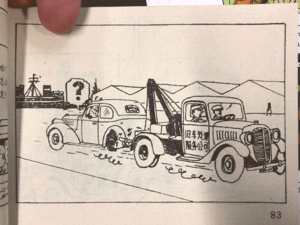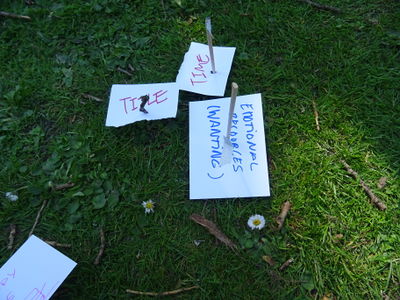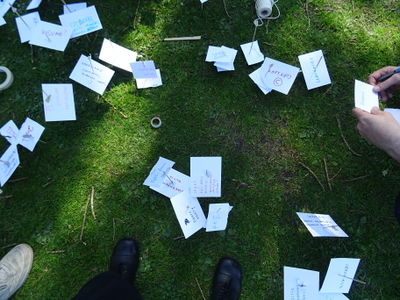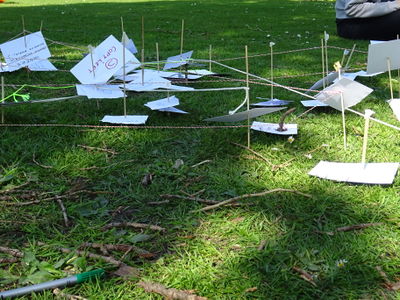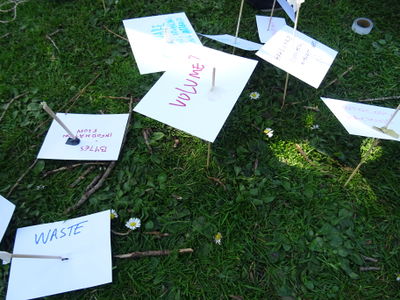User:Pedro Sá Couto/Special Issue 9: Difference between revisions
| Line 42: | Line 42: | ||
====Download | ====Download these fiels==== | ||
[[File: | [[File:makeocr.sh|thumbnail|MERGE SCANS]] | ||
[[File:makepdf.sh|thumbnail|OCR SCANS]] | |||
[[File:Makefile|thumbnail|Makefile]] | |||
==Online Class Project proposal== | ==Online Class Project proposal== | ||
Revision as of 17:20, 15 June 2019
Workshop Tryout
Introduction
Welcome to our {frictions, gain or loss} workshop. When one medium {physical book} is transferred to another {digital book}, situations that happen in the process are unintentionally invisible. Through the workshop, we will experience what are the steps necessary to build a phygital {physical-digital} library and reveal meticulously on what is the hidden labour and work process behind it. With this activity, we aim to reflect upon the physicality of a book when it is converted into a digital file, and vice versa. During the workshop we will question together on how we keep what is lost during these steps and how we could increase the life of the source.
What do you need for this workshop
Install Dependencies
- Mac
- brew install tesseract-ocr pdfsandwich rename make pdftk
- Linux
- sudo apt-get install tesseract-ocr pdfsandwich rename make
Installing the scanner
- Windows
- Use USB to connect the scanner ->
- Click send on the scanner->
- The images will be saved on your 'Scan' folder
- Linux
- Install Simple Scan
- https://launchpad.net/simple-scan
- sudo apt-get install simple-scan
- MAC
- Use USB to connect the scanner ->
- System Preferences ->
- Printers and Scanners ->
- Click "+" to add a new scanner ->
- Canon LiDE 120 should appear
Download these fiels
Online Class Project proposal
Femke in the small project space on-line
Project proposals 01
Identification traces that are left in digital books within Shadow libraries
Interested in researching the security levels for digital files (watermarkings, user traces, DRMs,...): where, how, on what level are they implemented. Looking at different shadowlibraries. How much care for visibility, anonymity, exposure? Forensic/anthropological interest. Document different strategies used by publishers in digital formats like epubs, pdf, etc
But also: wants to share his library, because uni-library in Portugal does not buy any new design books anymore. There is not a lot of interest from the institution nor from the students.
Annotation vs metadata question: does this watermarking become some kind of annotation and vice versa?
Questions
- Using this collection for the project?
- How to share/make public this research?
- How to interface with the users of the project on how to share books while raising awareness to these different security layers, identifying them, creating strategies to remove them, explore how to digitise and OCR….
- How are watermarks able to enphasise autorship and how to question this.
Thursday 16 May
What's on the table?
Pe
Technical field of research
How do publishers implement security layers on electronic books.
What are the watermarking annotation layers left on pirate libraries
What are the changes to the value of the book when these watermarks are added?
annotation + watermark: that become a metadata?
Annotation vs Metadata
Alain Resnais
Tout la memoire du monde (1956)
Reading on standards and categories from
Sorting Things Out, Geoffrey Bowker and Susan Leigh Starr (1999)
Annotating one hour of
The Internet's Own Boy (2014) — https://pad.xpub.nl/p/subtitles
annotation — PT
(Latin annotatio, -onis or adnotatio, -onis)
female noun
- Scoring.
- A written indication, usually brief or abridged, to record something that has been seen, heard, read or remembered. = POINT, NOTE
- Commentary.
- [Cinema, Theater, Television] A task or function that aims to establish consistency and consistency of all elements (images, sounds, cuts, sequences, characterization of characters, objects, spaces, etc.) of a movie, program, etc. (Equivalent in Brazilian Portuguese: continuity.)
"annotation", in Dictionary Priberam da Língua Portuguesa [online], 2008-2013, https://dicionario.priberam.org/anota%C3%A3o [consulted on 05-16-2019].
Workshop with Eva Weynmayr
Workshop with Eva Weynmayr: Borrowing, Poaching, Plagiarising, Pirating, Stealing, Gleaning, Referencing, Leaking, Copying, Imitating, Adapting, Faking, Paraphrasing, Quoting, Reproducing, Using, Counterfeiting, Repeating, Translating, Cloning Add reading here Add reflections of my book and Tancre
The Piracy Project — A Day at the courtroom — Transcriptions
File:The-Piracy-Project-A-Day-at-the-courtroom-PPP-Book-2014.pdf
WORDS
- Borrowing
- Poaching
- Plagiarising
- Pirating
- Stealing
- Gleaning
- Referencing
- Leaking
- Copying
- Imitating
- Adapting
- Faking
- Paraphrasing
- Quoting
- Reproducing
- Using
- Counterfeiting
- Repeating
- Translating
- Cloning
- Silencing
- Editing
- Omitting
- Reducing
- Appending
- Redirecting
- Recontextualising
- Focusing
- (Faithfully) Reproducing
- Caring
- Reformatting
- Bootlegging
- Reframing
- Retracing
Tancredi & Pedro
The Crab with the golden claws — The adventures the tintin
ILLUSTRATION
- pirating
- adapt to fit a new format
- translated
- the story is refreamed and reduced
- the draw is retraced (Biyi points out that it could have been because in China it would have been cheaper to pay someone to do it rather than to pay the copyright) and expandend (to fit the format)
- the drawings are rotated (To fill a full page as in the original)
- rescaling, localising (small format tradition)
COVER NAME
- The capture of the red claw crab drug dealing company (May have to deal with strong color symbolism related to China / anti drug )
- The intention was to change the format of the book.
http://gen.lib.rus.ec/book/index.php?md5=AFE9A156A14C533959B6CC6137E1D85D — Translated
https://www.amazon.com/Adventures-Tintin-Golden-Claws-Chinese/dp/7500794886 — Chinese Cover
http://gen.lib.rus.ec/book/index.php?md5=86C3D07238F8A0978D2FF1D15BB2DE95 — English Edition
Deleuze - Proust and signs
http://library1.org/_ads/7A0C353A22C76D2B7BD7BF73BB3BFA42
- fetishist reproduction
- home reproduction feeling
- page trasparency
- His strategy is to make an homemade reproduction of the book which could look like as much as possible as the original one but when looked with attention you notice differences (not professional binding method, different paper, rough cut, homemade hardcover )).
- In this way the pirated copy can be introduced inside libraries or bookshops without arouse suspicion. This act can be understood on one hand as a critique of the standardadization of books (format, style..) and on the other hand as a critique of book's market and publishers where official texts are produced negating the homemade in the topclass market and its power, capable to produce a quasi-perfetct copy.
- Furthermore, the original copy contains upside down pages, so probably it is a discarded copy of the industrial process. The entire mass production of books became a mechanism of selection and exclusion where the error must be deleted and his circulation becomes a taboo. This taboo here is glorified (in the reproduction of the taboo itself) and putted again in circulation as a normal edition representing the exclusion which still survive hidden in the multitude of books. The interest to reproduce exactly the same book reveal a maniacal interest in the original, emphatized by the uniqueness of this particular copy. Reproduce and reintroduce in a shop this kind of product represent both a fetishism of the book and its singularity, as well as the critique of the standardization and industrialization in the market. The content of the book seems to be overcomed to talk about the physical book and its use in the market. It would have been interesting to have 'totem and taboo' as book to reflect the act and the book's content but anyway it can be done a link with Deleuze's text 'difference and repetition' where the repetition represent the industrial process or the totemization of the standard book, and the difference the taboo of the error and the handmade.
@ Rietveld Academy library
with Eva, Martino + Anita @ Rietveld Academy library
https://pad.constantvzw.org/p/rietveld_library
Workshop with Bodo Balasz
Reading: Bodó, Balázs (2019): The science of piracy, the piracy of science.
Who are the science pirates and where do they come from Part I + Part II
https://pad.xpub.nl/p/IFL_bodobalasz
https://pad.xpub.nl/p/libgen_top10
PORTUGAL LIB GEN
General observations:
- 1 book in portuguese (a translation), all others in english
- almost all universities make available the mandatory books for the year through photocopy/copy store, this can have an impact in downloads
BOOK 1
The SAGE Handbook of Qualitative Research
444166, 34, Norman K. Denzin, Yvonna S. Lincoln, The SAGE Handbook of Qualitative Research, Sage Publications, Inc, 2005, English
ISBN: 9781483349800
oficial publisher — Sage Publications, £120.00
pirate — LibGen, available
3 portuguese bookstores:
Fnac — 129,89 €, not available in store
Bertrand — 148,82€, not available in store
Wook — 148,82€, not available in store
international:
amazon.com — $132.14, in stock with more buying choices, ebooks, etc.
Found in public libraries (Porto and Lisboa)? no
Syllabus of:
Degree (BSc) in Psychology, ISCTE-IUL (note: this is a well-rated university in Lisbon, capital city)
(https://fenix.iscte-iul.pt/disciplinas/l5207/2018-2019/2-semestre/bibliografia?locale=en_EN_ISCTE)
BOOK 2
Psicologia
881883, 32, Henry Gleitman, Alan J. Fridlund, Daniel Reisberg, Psicologia, Fundação Calouste Gulbenkian, 2003, Portuguese
ISBN: 9789723113709
oficial publisher — Fundação Calouste Gulbenkian, 40.00€, not available (the foundation has a partnership with Ebooks from Marka, the book was not available there either)
pirate — LibGen, available
3 portuguese bookstores:
Fnac — 32€, available
Bertrand — 40,02€, not available
Wook — 40,02€, not available
international:
amazon.com — only option: buy new, $203.00, available
Found in public libraries (Porto and Lisboa)? yes
Syllabus of:
Universidade Católica Portuguesa, Psicologia course (https://fch.lisboa.ucp.pt/asset/4016/file) (note: this is a well-rated university in Lisbon, capital city)
Universidade Lusófona, Ciências Sociais course (revistas.ulusofona.pt/index.php/cadernosociomuseologia/article/view/2672/2039)
BOOK03
Introduction to the Human Body
777469 28 Gerard J. Tortora, Bryan H. Derrickson Introduction to the Human Body Wiley 2009 English
in Lib gen : pdf
Wook: 63,24€ Online store, available
Bertrand: 63,24€ Online store, available, Not available physical in store
FNAC: 66,29 € Needs to be ordered online, takes 1 to 2 weeks
Amazon: Hardcover Rent, $24.99, Due Date: Aug 13, 2019 Rental Details, FREE return shipping at the end of the semester., Access codes and supplements are not guaranteed with rentals.
Buy new, $66.66, In Stock.
E book not available
BOOK04
Atlas of Human Anatomy 4e (Netter Basic Science)
819203 26 Frank H. Netter MD Atlas of Human Anatomy 4e (Netter Basic Science) Saunders 2006 English
in Lib gen: pdf
Wook: Not available
Bertrand: 80,73€ — Online store, available, Not available physical in store
FNAC: 63,90 € Online and in stock
Amazon: Buy new, $71.97, 1 In Stock.
Buy used, $15.69, Condition: Good
Syllabus of Anatomia e Histologia , Universidade de Coimbra
https://sigarra.up.pt/fcnaup/pt/ucurr_geral.ficha_uc_view?pv_ocorrencia_id=331954
Syllabus of DEPT. DE FÍSICA
http://fisica.uc.pt/fa/20092010/showit__uc.php?id_disc=155&id_typ=4&lnkd=links11non&lnkdi=links11non&lkwc=:QwM:fisica:QhM:class:QhM:getpresentation.do:QqM:idclass:QkM:114:QgM:idyear:QkM:4&ckwc=&inwc=1
Teaching Human Anatomy to the Graduation Course in Health Sciences of the Lisbon University: Five Years of a New Educational Experience
https://www.google.com/url?sa=t&rct=j&q=&esrc=s&source=web&cd=18&cad=rja&uact=8&ved=2ahUKEwjfmLuqwYniAhWBCewKHb8CCc84ChAWMAd6BAgIEAI&url=https%3A%2F%2Fwww.actamedicaportuguesa.com%2Frevista%2Findex.php%2Famp%2Farticle%2Fview%2F4254%2F3358&usg=AOvVaw0U_aDrYNW1_pU3vrEasgzd
Syllabus of Universidade de Aveiro, Escola Superior de Saude
http://www.ua.pt/essua/PageDisc.aspx?id=2863
BOOK 05
The Oxford History of Ancient Egypt
746957, 25, Ian Shaw (editor), The Oxford History of Ancient Egypt, Oxford University Press, USA, 2000, English
isbn :9780192804587
oficial publisher —
pirate — LibGen, available
3 portuguese bookstores:
Fnac —15,20 €, not available in store
Bertrand —16,11€, not available in store
Wook —16,11€, not available in store
international:
amazon.com —$15.50, with other buying options
Syllabus of:
Universidade de Lisboa (http://repositorio.ul.pt/bitstream/10451/2461/1/ulsd059259_td_vol.2_13.%20Bibliografia.pdf)
BOOK09
Cosa: the Italian sigillata
814731 22 Maria Teresa Marabini Moevs Cosa: the Italian sigillata University of Michigan Press 2006 English
in Lib gen: pdf
Wook: 0 results
Bertrand: 0 results
FNAC: 85,18€, Online 1 stock
Amazon: 88.63$, 2 In Stock.
m-e-t-h-o-d-o-l-o-g-i-e-s (or not)
Download kit: m-e-t-h-o-d-o-l-o-g-i-e-s (or not)
- Q + Q
- Response-ability
- Phenomenal cartography
- s\p\e\l\l\i\n\g and/or Diffractive reading and/or Renaming|reframing
Readings & References
https://fermentos.kefir.red/english/aco-pele/
https://anarchaserver.org/mediawiki/index.php/Anarchagland
Ursula Le Guin, The Carrier Bag Theory of Fiction
https://xenopraxis.net/readings/stengers_capitalistsorcery.pdf
https://www.feministsearchtool.nl
https://herman.memoryoftheworld.org/
https://0xdb.org/
Karen Barad, Diffracting Diffraction: Cutting Together-Apart (2014)
Introduction to Shadow Libraries
Pedro & Rita
LIBRARY GENESIS (http://gen.lib.rus.ec/ )
Content : What is in the library? How much?
- In 2014 it had 25 million documents (42 terabytes)
Users: Who is using / uploading / downloading?
Catalog: What is the system? How is it organised? How about its ontology?
- You can search by topics, or by genre (fiction, comics, etc.)
- an index list is provided in each category
- no curation, everythings seems valid. From their FAQ: "we are random book collectors: if we see a book somewhere and it's not in LG yet, we take it.", "We do not fetch specific books, we rather gather collections from public zones on the Web."
- uploading is advertised as being very easy, a lot of duplicated material
Infrastructure: What are technical specs? Software? Hardware?
- russian servers?
Politics: What is the attitude?
- they seem to distance themselves from the idea of bringing academic research for people without acess/ Sci-Hub
"If you are from India, Pakistan or Iran, you may have difficulties with finances and be tempted to place such requests, then this answer is for you. There may exist some sites on the net that can help you find certain books upon request, but we simply cannot do this. If you need the book urgently and it's missing in LG, please, do not rely on us and try to get it from some other place."
Economy: Sponsors? Donation? Advertising?
- No sponsors or donations visible on the website, nor in the site map or forum.
- Advertise on download
- In Reddit you can find a board (https://www.reddit.com/r/libgen/comments/2m2m1p/libgen_needs_donations_for_a_new_server/) where they have asked for a donation in bitcoin to buy a new server
ABSTRACT
Library Genesis is a digital library with a catalog of more than 25 million documents. The website owners describe themselves as “random book collectors”, which means they don’t accept requests or focus on curating materials. The topics are broad: from business, economy, and geology to housekeeping and leisure. The dimension of this library is enormous, there are even several copies of the same books. The content is always written material.
Although this huge library seems to take information without any specific methodology, the reasons don’t seem completely apolitical. The main page of the website links to a letter of solidarity with strong opinions on sharing materials, copyright, moral values, etc.
All people are encouraged to upload content and to download it too. There’s no score to maintain, log-in necessary, or price to pay. The desire of the platform to exist is well seen in the possibility of downloading all content, accessing the database and making mirrors.
QUESTIONS
- What could be the motivation to make such a library? What is the message they might be trying to spread?
The scale, the amount of data provided in a library is directly related to the energy and time needed to provide them. How is responsibility distributed ? How are shadow libraries of different scales and purposes interconnected? Are shadow libraries interconnected to each other, even if they have different scales and purposes, because what they have in common is that they brake the law (so they are vulnerable)? flag of convenience Do they have moral goals, or anarchist goals? Is an anarchist goal immoral (or moral)? Symbolic gesture Is it a solidarity gesture? You can copy the website and mirror it. They don't claim ownership Is there a heroic attitude of "liberating" knowledge? (robin hood style)
- What values does it communicate?
Can these values be seen as coming from a particular cultural context (e.g. post-Communist, Eastern-bloc samzidat techniques)?
- Is it moral to publish books which have a commercial goal?
- Is the librarian replaced by a random algorithm?
Is there a librarian? Who is responsible and what are they responsible for? Non-curation can be a critical position; it is nort imposing a particular position.
- Are they collecting material just because they can?
Yes! No filters; Is this dissident activity? They don't care a lot about the quality, everything is welcome. Duplicated material
- Do they try to curate doubled material?
- Why is it easier to support piracy for academic research than for recreational purposes?
Distinctions between "knowledge" and "information" / Democratic principle of sharing knowledge in the name of progress / Providing a benefit to society What are the conditions of making something legitimate? (if we shift back to copyright - see also bootleg drugs,) benefit for the greater good? is it based on profit? What would be the first shadow library to be considered legitimate? Why can't a fiction book (or anything besides articles) be considered research, culture, important to share, meaningful...?
.ONION LIBRARIES (http://mx7rwxcountermqh.onion/ )
(http://libraryqtlpitkix.onion/ )
Content : What is in the library? How much?
- Much less content, curatorial side, small list of books, focused on one/two categories. libraryqtlpitkix is focused on sciences.
#Users: Who is using / uploading / downloading?
- You have to acess them through a different kind of browser, we used Tor.
It's hard to find them by chance, there must be an effort to see these libraries. very specific are these book hard to find in libgen? rare findings?
Catalog: What is the system? How is it organised? How about its ontology?
- Different kinds of organization, either in a one page with scroll list that fits
In a warezy way, with directories, all stored and organized together
ABSTRACT
Libraries like "The library" http://www.libraryqtlpitkix.onion/ and "Clockwise libraries" https://clockwise3rldkgu.onion operate within the invisible web, or hidden web are parts of the World Wide Web. Their content is not indexed by standard web engines, instead, these libraries are indexed in specific web pages just as "http://mx7rwxcountermqh.onion/". In this index, you can find an annotated list of URLs, with a small description to what each of these links is focused on.
These Libraries are not as straight forward to find, you often have to use different browsers to access them what makes them hard to come across with, making them more specific to a determined public. It is interesting how they can be seen as forming some sort of ring between themselves, also bringing a sense of community to the numerous projects found. Very few onion libraries use Calibre as a way to distribute and organize books, this is mainly because they demand the use of javascript, which is a great private vulnerability while using these browsers.
Regarding their organization, it is noticeable the way how they are curated. A lot of the projects are organized just like a folder in someone's computer. Take for example “The library”, a library that mainly focuses on sciences, with topics such as, Biology, Chemistry, Neuroscience, Physics, etc, this one looks just like a computer directory, where there is no index but the different data is stored inside folders and when you open them all the content fit in one scrolling HTML page. There are also other archives that appear to be personal libraries just as "Pokedudes Archive of Interesting and Odd Files”, a place where they organize what is described as being “a small list of ”weird or interesting files”.
QUESTIONS
- What could be the motivation to make such a library?
- Who is the target audience of this library? (exclusive channel) because this material is hard to find, these libraries don’t seem to follow the narrative of “open content for everyone”.
- Is the content of this library more exclusive that the one that you can find in the well-known (easier to access) ones?
- What makes it unique?
- If you do not have an index. How are you looking for something in this library? Is it just a process in which you came across with random material?
Interfacing the law
Pirate libraries, shadow libraries, piratical text collections, amateur digital libraries, peer produced libraries and how to read them together.
- Letter 1: In solidarity with Library Genesis and Sci-Hub
- Letter 2: Alexandra Elbakyan to Mr. Robert W. Sweet
- Letter 3: Dear participants in Interfacing the law!
Email 01 — Letter 3
Dear all,
By way of kicking off the next Special Issue, please find a letter attached. The issue starts on Monday with a session hosted by Aymeric.
You can find the calendar and some additional resources here: http://pzwiki.wdka.nl/mediadesign/Interfacing_the_law_(2019)
All the best and see you next week! Femke

